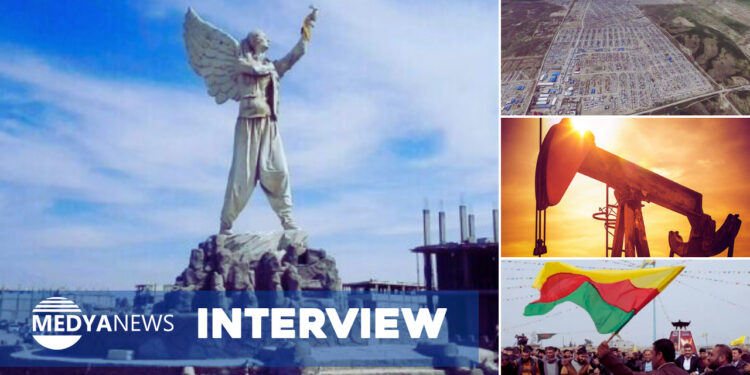The Syrian pound has lost its value against the dollar ten times over since 2020, and hundreds of times since the start of the Syrian revolution in 2011 – fuelling a worsening economic catastrophe across the country, including in the autonomous, Kurdish-led region of North and East Syria (NES). Locals report markets empty of customers, and a daily struggle to put bread on the table. Medya News spoke to Cheleng Omar, a leading Syrian Kurdish economist, to ask what steps can be taken to ameliorate the crisis.
Beyond runaway inflation, what are the major economic challenges facing North and East Syria?
A general economic crisis has reached North and East Syria (NES). The basis of the regional economy is agriculture and oil, both of which are affected. Agricultural fields and irrigation systems have been damaged in shelling, while Turkish control of the Allouk water station and throttling of water into the Euphrates has created a major negative impact on agriculture.
The output from the region is diminishing, and [does] not correlate to its capacity. Damage from shelling has also affected petrol infrastructure. There’s a need for pumps and other machinery to be renovated, but the requisite tools can’t enter the region, due the embargo which doesn’t allow technological implements to enter. The economic blockade is making it difficult for value for be extracted; this is compounded by refugee flight, since many technical experts and skilled people have left the region. There’s no stability, due to the Turkish threats against the region, and while it’s true American sanctions on Syria have been lightened, this has brought no benefit.
In addition to the lack of material support, the financial sector must be strengthened. There’s no banking system in NES, as a result of the embargo, and this creates a significant negative impact, making it difficult to transfer money in and out of the region.
How do the profits from the region’s oil wealth reach ordinary people in NES?
It’s true, oil is the main product of the region, which the Autonomous Administration relies on for its income – [this lack of diversity is] due to the embargo the region is under. There are some custom tariffs. As the Autonomous Administration is trying to increase economic autarky, there are only small tax rates on manufacturing and agricultural projects, plus a small rate of personal income tax.
Around 75% of the Autonomous Administration budget is derived from oil sales, while around 40% of the annual budget goes to subsidising cheap fuel and cheap bread to help the people; in addition to infrastructure and reconstruction projects, refurbishing and building new roads, hospitals offering free medical services, and free education in peoples’ mother tongues. It’s also distributed as salaries, to over 200,000 officers and workers.
Can the Autonomous Administration’s proposal for a ‘cooperative economy’ play a genuine role in resolving these challenges?
The Autonomous Administration’s approach is to create and support cooperatives, but they haven’t advanced far. The Autonomous is trying to support these projects, for example by providing subsidised diesel, just as it distributes diesel to the people at a very cheap cost. They support the cooperatives, agriculture and small manufacture, in pursuit of economic autarky.
But this autarky hasn’t been achieved: the necessary mentality for cooperatives and solidarity economic projects isn’t there. Each village, each commune, each cooperative should be able to meet its own needs, but such a system has not yet been established. There’s a need for education, so that people grow less concerned with achieving profits, and replaced with an appreciation of use value, rather than exchange value.
It’s often said that NES is under an ‘economic embargo’. What does this mean in practice?
It’s not a total embargo – this a political question. [The closure of the border] is linked to security and political conditions, both at the sole crossing connecting NES with the Kurdistan Region of Iraq, which is often closed, and at internal borders between regions under the control of the Syrian regime.
Trade does take place, but products brought from outside – like sugar, cement or iron – come at a heavy cost. For example, a delivery of cement might cost $500 at the port of arrival, but increase to $700 by the time it arrives to our region. Moreover, there’s a continued embargo on tools and technological supplies, making it difficult to conduct advanced building projects. Meanwhile, following the closure of the border crossing with Iraq at Tel Koçer, all UN aid gates are closed, while the interior border crossings are also sometimes closed to aid. Even ambulances are sometimes not permitted to enter – and these are ambulances the Autonomous Administration has purchased itself, not aid.

